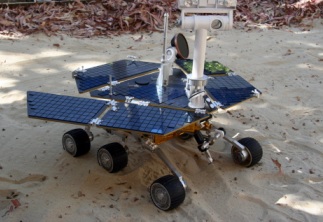Jet Propulsion Laboratory
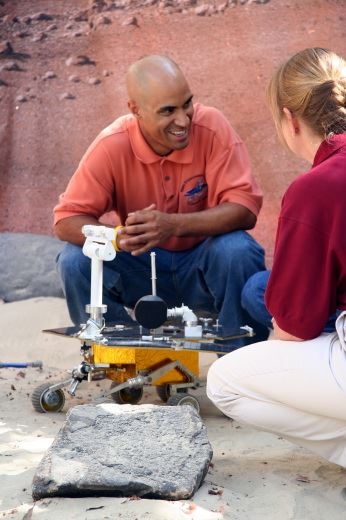 |
Kobie Boykins, Senior Mechanical Engineer, NASA Jet Propulsion Lab, CA, shares a laugh with the Argonaut team. |
 |
Scientists like Kobie are dispelling the myth that science and engineering are simply "for the nerds." A Senior Mechanical Engineer for NASA, he was one of six scientists and engineers chosen as the "rock" stars of NASA's 'Marsapalooza' tour of 2003. Dubbed by NASA as 'one of the most intelligent people on earth,' Kobie was a member of the mechanical engineering team that designed the Mars rover and was in charge of equipment deck integration for both of the Mars Exploration Rovers! Yet outside that incredible brain, is youthful brawn. Kobie is a big hockey fan and a former forward for the Caltech Beavers.
He is considered a hip, young scientist who is helping to disprove the "geek" myth often associated with scientists and engineers. In other words, Kobie is further proof that SCIENCE REALLY IS COOL!
How did you end up in the field you are in today?
I entered the field of engineering in no small part because I watched Star Trek. I know it is a cliche, but I wanted to build interstellar vehicles. It seems that my current work is the next best thing. I really got started in this direction in 5th grade when my teacher took an interest in me as a student. I was the class clown. I didn't really like spelling and I was good at math and science. She asked me what I wanted to do in the future. I thought to myself that I want to be like those guys I see on Star Trek. With that she helped me see the importance of studying and really applying myself to achieve whatever goal I would like. Just a little push in the right direction! I later found my love of taking things apart. Because of this my mother introduced me to this amazing field of Engineering. Following the Star Trek theme, I wanted to be Geordi LaForge. Now, I know that this wasn't a reality, but engineering was. So I went to school at RPI: Rensselaer Polytechnic Institute in Troy, NY.
What do you like best about your job?
I like the fact that I get to create new things that will go to space. What can be cooler then that? I can say that I designed hardware on the surface of Mars. There are not a lot of people on Earth that can say that!
What are the most common misconceptions that people have about what you do?
I think the most common misconception that people have about engineers is a stereotype of how engineers look and what they do in their off time. The pocket protector and the glasses with tape on them and the homebody look. I haven't seen all the things that my colleagues do, but I know in the last few years we have had one of our engineers on Survivor and another friend married a Survivor. I think that we are just regular people with very extraordinary jobs. We all get to have fun at work!
Why do you think it is important for students to make comparisons between Earth and Mars, and what can we hope to learn by doing that?
The answer to that is a question, "What happened to Mars?" What I mean by this is that if Mars was once like Earth with lakes and oceans, what happened to them? Does this mean the same thing could happen to Earth? If that isn't a reason to look to the stars and understand what is happening, I don't know what is!
What advice would you give to students who are interested in studying science?
Studying science and engineering is not a job, it really is a passion. If you like science, math, and the pursuit of knowledge, this is a very rewarding field. In terms of careers, engineers and scientists create, invent, and produce. I don't know what we don't do. The amount of arenas you can go into are so vast, it is mind-boggling.
When you are not working, what do you like to do for fun?
Well, I play ice hockey and have played since I was young. I also play football and basketball with friends. We have started to play poker from time to time as well as just hanging out and talking about life. I ride a motorcycle and have started, in the last year, racing on the track. I go to the movies when I have time and enjoy the mountains for skiing and just to get out of the city.
What would you most like students to learn from participating in the JASON Expedition: Mysteries of Earth and Mars?
The search for knowledge is a task that continues throughout your life, and a day without learning something new is a lost day!
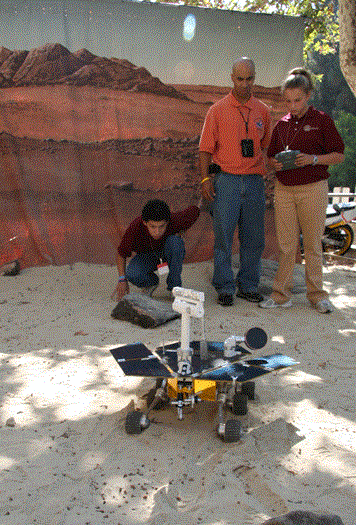 |
JASON Student Argonaut Janelle Wilson drives a Mars rover prototype at NASA Jet Propulsion Laboratory as Student Argonaut Antonio Campos and NASA Senior Mechanical Engineer, Kobie Boykins, look on. |
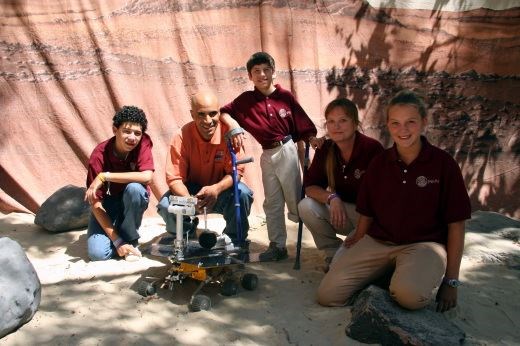 |
The team:From left to right: Antonio Campos, Kobie Boykins, Alex Garrett, Jean Robinson, and Janelle Wilson. |
 |
In school, he enjoys everything from Mathematics to Social Studies, but his favorite subject is Life Science. In addition to excelling in academics, Alexander participates in sports and other physical activities, including the Empire State Games for the Physically Challenged, held annually on Long Island, and children's races with the New York Road Runners Club.
He also uses his own special talents and personal life experience to help others. He has been a junior spokesperson for 'Variety - The Children's Charity,' in New York City. Since 1999, Alexander has been a TV spokesperson for his school on the Variety Telethon and last year was a representative on the student council.
How did you become involved with the JASON Project?
My teacher asked if anyone was interested in applying and I told her I would like to apply. I filled out and sent the application and was invited to be interviewed.
What do you feel you have learned or gained from this experience?
I have learned about teamwork and gained more knowledge about Science, and traveling by myself. I learned about constructing different things like rovers. I learned about force and pressure in dealing with bottle rockets. I also learned how different people solve problems and teach others.
What was the coolest thing you did, or learned, throughout this process?
I learned about and operated a Mars 3rd scale rover at the JPL in Pasadena. The rover was 1/3rd the size of the official rover.
What was it like working with these amazing scientists and educators?
They knew a lot about science and taught me; it was a lot of fun.
How do you feel about the expedition you participated in? Can you tell us how this particular expedition can be a good learning tool in classrooms, or for other kids?
Technology is a great thing to learn about. It is used in science for research, and will continue to be an important part of studying in the future.
What career options are you considering for the future? Do you think it will be something in science or technology?
I wasn't thinking about a science career; this gives me something new to look into. Before the expedition, I was thinking about a sports broadcasting job and now I am looking forward to the new [things] I will be learning in high school.
What are your hobbies?
Playing sports, going to sporting events and broadway events, talking to friends and strangers, and enjoying life.
Who is YOUR hero, and why?
My father. He helps me through life. He makes sure I understand different aspects of life. He enjoys life as well. He loves me very much.
What else would you like to tell kids around the world about yourself, or your experience as an Argonaut, etc.?
Don't be afraid to try something you've never done before.
Page created on 8/16/2014 6:21:08 PM
Last edited 8/16/2014 6:21:08 PM

For over a decade JASON Expeditions have taken place around the globe.
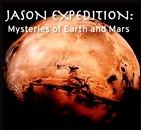
Summer of 2005's JASON Project expedition, “Mysteries of Earth and Mars,” explored several different locations around the United States. The student and teacher “Argonauts," along with a team of renowned researchers and scientists, helped "unravel the mysteries of Earth and Mars" as they compared the two planets through exciting scientific exploration!
Scientists know that Earth and Mars share a common origin in the solar system, yet are two planets which evolved very differently. By visiting locations on Earth whose environment could best be paralleled with that of Mars, and which, despite extreme conditions, have life forms thriving therein, the JASON team was able to theorize about the types of life that could potentially exist in the extreme conditions of 'the red planet' as well.
